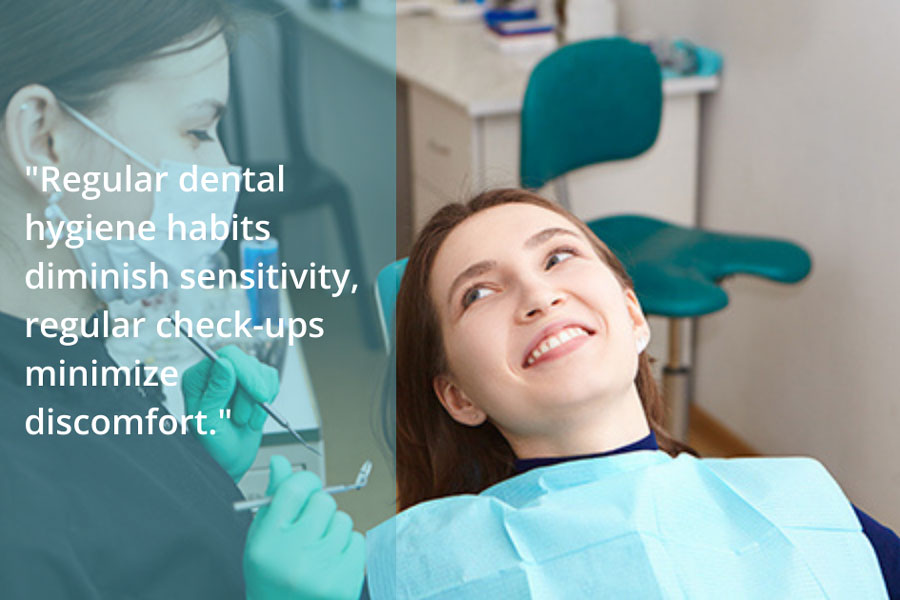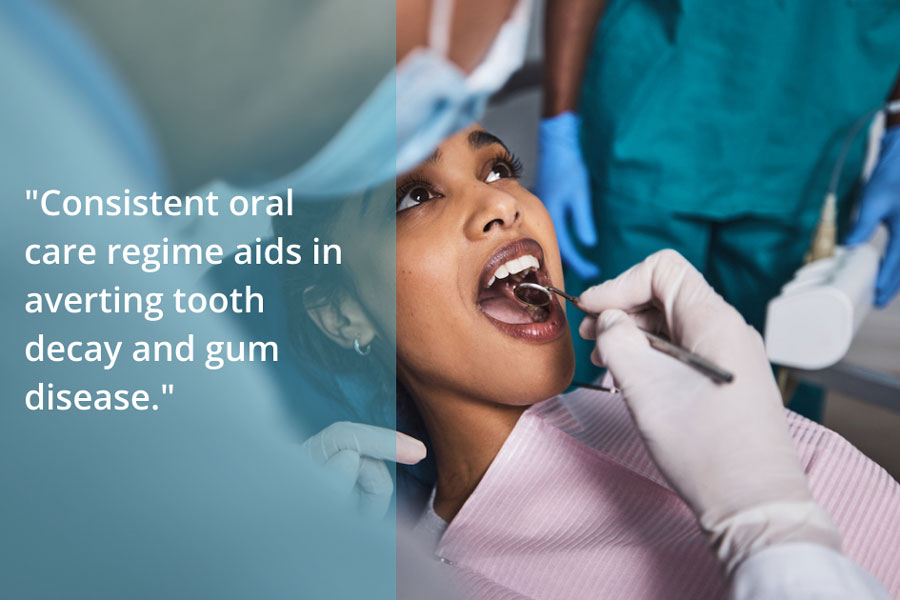Did you realize that the discomfort felt during dental cleanings can be significantly affected by the state of your gums? If you’ve experienced discomfort while sitting in the dentist’s chair, you’re not the only one. Numerous individuals connect dental cleanings with pain, but the severity of this discomfort can differ dramatically from one individual to another.
Elements such as gum health, the time elapsed since your previous cleaning, and even your personal pain tolerance can all contribute. Here’s a fact to consider: there exist methods to reduce this discomfort and make your trip to the dentist a more enjoyable encounter.
Understanding Dental Cleaning Discomfort
Often, factors such as sensitive teeth and gums, inflammation, tartar buildup, exposed nerve endings, and even anxiety can contribute to discomfort during dental cleanings. It’s crucial to comprehend the reasons behind this discomfort, as it helps manage and decrease the potential pain.
Your sensitivity could be natural or due to conditions like thinner enamel or receding gums. Inflammation and gum disease can heighten your gums’ responsiveness to touch, leading to pain during dental cleaning. Neglecting regular dental hygiene can result in deep tartar buildup, necessitating more intensive cleaning and potentially heightening discomfort.
Understanding these factors and adopting preventive measures, including regular dental hygiene and using desensitizing products, can considerably lessen discomfort during dental cleanings.
Factors Contributing to Pain
The current condition of your oral health significantly influences the level of discomfort you may feel during a dental cleaning. Several aspects can intensify the pain experienced during dental cleanings, and being aware of these can guide you in taking steps to alleviate the pain.
- Gum Health: An inflamed or infected gum line may intensify the pain during teeth cleaning.
- Tooth Sensitivity: If your teeth are sensitive, dental cleanings could be uncomfortable.
- Frequency of Cleanings: If you allow extended intervals between cleanings, there could be an accumulation of more plaque, which might render the cleaning process more painful.
- Oral Hygiene Practices: Consistent and thorough brushing and flossing may help in reducing discomfort during cleanings.
- The Right Dentist: Opting for a dentist who’s empathetic towards your sensitivity issues can significantly impact your experience.
Understanding these factors and adjusting accordingly can help make your dental cleaning experience less uncomfortable.
Importance of Regular Dental Visits

Comprehending and managing elements that lead to discomfort during dental cleanings can reduce the pain involved. It’s also crucial to recognize the significance of regular dental visits for overall health. Your dentist is instrumental in preserving your oral health and warding off dental issues.
Scheduled dental cleanings every six months can stave off gum disease and its resulting complications, thus enhancing your oral health significantly. It’s essential to remember that your teeth are linked to four major bodily systems, making their appropriate upkeep critically important.
Regular dental visits can promote optimal oral hygiene, lessen discomfort during cleanings, and result in improved dental health. The impact of these routine check-ups shouldn’t be undervalued.
Overcoming Teeth and Gum Sensitivity
Working through the issue of teeth and gum sensitivity may seem daunting, yet several feasible strategies exist that could alleviate the discomfort felt during dental cleanings.
Here are some techniques that may prove beneficial:
- Opt for a desensitizing toothpaste that has the potential to decrease gum sensitivity.
- Openly discuss your fears about pain with your dental practitioners.
- Consider taking an over-the-counter pain reliever such as Advil before your appointment.
- Uphold a consistent oral hygiene routine, incorporating both brushing and flossing.
- Seek out a hygienist reputed for their gentle approach.
How to Reduce Dental Cleaning Pain
After studying ways to fight sensitivity in teeth and gums, we now shift our attention to specific measures aimed at lessening pain during dental cleanings.
It’s crucial to understand that dental cleanings shouldn’t cause pain if you adhere to routine hygiene and regular check-ups.
Desensitizing products such as Sensodyne Pro Enamel can be utilized to make your cleanings less painful. It’s important to have an honest conversation with your dentist or hygienist about any discomfort.
Using pain relievers before and after the cleaning can help decrease inflammation and discomfort. If dental cleanings cause significant distress, think about asking for numbing medication for a more comfortable and safe experience.
Implementing these strategies can aid in making dental cleanings more bearable and painless. Pain should never impede the pursuit of good oral health.
Role of Anxiety in Dental Discomfort
Anxiety has a substantial effect on the discomfort experienced during dental cleanings, even if you may not be aware of it. The fear and stress you feel can amplify your pain sensitivity, resulting in a perception of the cleaning process as more painful than it is.
Here are a few ways anxiety can affect your dental health and methods for managing it:
- Anxiety can heighten your sense of discomfort.
- Stress can intensify your pain sensitivity.
- The use of relaxation techniques can help in reducing anxiety.
- Discussing your fears openly with your dentist or hygienist can result in personalized care.
- Taking steps to manage your anxiety can enhance your overall dental visit.
It is crucial to maintain good oral hygiene and regularly visit for dental cleanings, so ensure that anxiety doesn’t prevent you from looking after your oral health.
Tips for a Comfortable Dental Cleaning
Managing anxiety can enhance your experience at the dental office. Regular dental hygiene is crucial as it eases gum sensitivity and aids the hygienist, leading to a less painful cleaning. Usage of desensitizing products such as Sensodyne toothpaste before your visits can be beneficial.
It’s important to communicate with your hygienist about any discomfort you’re feeling. Taking a pain reliever, for instance, Ibuprofen, before your appointment might also be useful. These steps, along with anxiety control, can greatly lessen discomfort and ensure your teeth receive the necessary care without causing excessive stress.
Benefits of Consistent Oral Hygiene

Maintaining consistent oral hygiene habits, including regular brushing and flossing, can act as a safeguard against unpleasant experiences during dental cleanings. Your dental hygienist will affirm that upholding a rigorous oral care regime aids in averting tooth decay and gum disease, leading to more tolerable cleanings.
Here are the advantages of sticking to a consistent oral hygiene routine:
- Minimises uncomfortable issues during dental cleanings
- Contributes to healthier gums and decreases the chance of bleeding during cleanings
- Assists in fighting gum disease, preventing symptoms such as swollen and bleeding gums, bad breath, and tooth sensitivity
- Lessons tooth sensitivity, making the removal of tartar less distressing
- Encourages robust, healthy gums, reducing pain and bleeding during dental cleanings
Embracing Ease in Dental Cleanings
Don’t let apprehension about potential discomfort steer you away from dental cleanings. You hold the reins to your oral health. Consistent hygiene habits diminish sensitivity, regular check-ups minimize discomfort, and techniques to manage anxiety can make this experience a comfortable one.
Comprehending and conquering discomfort doesn’t just ensure a healthy smile, it also helps you embrace a healthier, confident self. So, exhale deeply, and let’s transform your upcoming dental visit into a victory over discomfort.
Remember, your dental health is a crucial part of your overall well-being. Don’t hesitate—schedule your next dental cleaning now at Dripping Springs Family Smiles in Dripping Springs, TX, and take the first step towards a healthier, more confident version of yourself.